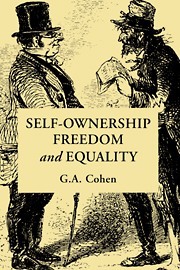Book contents
- Frontmatter
- Contents
- Preface
- Acknowledgements
- Introduction: history, ethics and Marxism
- 1 Robert Nozick and Wilt Chamberlain: how patterns preserve liberty
- 2 Justice, freedom, and market transactions
- 3 Self-ownership, world-ownership, and equality
- 4 Are freedom and equality compatible?
- 5 Self-ownership, communism, and equality: against the Marxist technological fix
- 6 Marxism and contemporary political philosophy, or: why Nozick exercises some Marxists more than he does any egalitarian liberals
- 7 Marx and Locke on land and labour
- 8 Exploitation in Marx: what makes it unjust?
- 9 Self-ownership: delineating the concept
- 10 Self-ownership: assessing the thesis
- 11 The future of a disillusion
- Bibliography
- Index of names
- Subject index
4 - Are freedom and equality compatible?
Published online by Cambridge University Press: 29 August 2009
- Frontmatter
- Contents
- Preface
- Acknowledgements
- Introduction: history, ethics and Marxism
- 1 Robert Nozick and Wilt Chamberlain: how patterns preserve liberty
- 2 Justice, freedom, and market transactions
- 3 Self-ownership, world-ownership, and equality
- 4 Are freedom and equality compatible?
- 5 Self-ownership, communism, and equality: against the Marxist technological fix
- 6 Marxism and contemporary political philosophy, or: why Nozick exercises some Marxists more than he does any egalitarian liberals
- 7 Marx and Locke on land and labour
- 8 Exploitation in Marx: what makes it unjust?
- 9 Self-ownership: delineating the concept
- 10 Self-ownership: assessing the thesis
- 11 The future of a disillusion
- Bibliography
- Index of names
- Subject index
Summary
The first man who, having enclosed a piece of land, took it into his head to say, ‘This is mine’, and found people simple enough to believe him, was the true founder of civil society. The human race would have been spared endless crimes, wars, murders, and horrors if someone had pulled up the stakes or filled in the ditch and cried out to his fellow men, ‘Do not listen to this impostor! You are lost if you forget that the fruits of the earth belong to everyone, and the earth to no one!’
(Jean-Jacques Rousseau, Discourse on Inequality)Introduction
1. Two kinds of response to Nozick were contrasted in Chapter 3. In the first, a premiss that equality of condition is morally mandatory is used to reject his starting point, the thesis of self-ownership. But this first response (so I claimed) has the defect that the idea of self-ownership enjoys an initial appeal which so swiftly derived a rejection of it will not undermine. (In Chapter 10 I hope to undermine it in the more painstaking way that I think is necessary.)
In light of the poverty of that first response, a second response was projected (see Chapter 3, p. 71), which proceeds in two stages.
- Type
- Chapter
- Information
- Self-Ownership, Freedom, and Equality , pp. 92 - 115Publisher: Cambridge University PressPrint publication year: 1995
- 2
- Cited by

